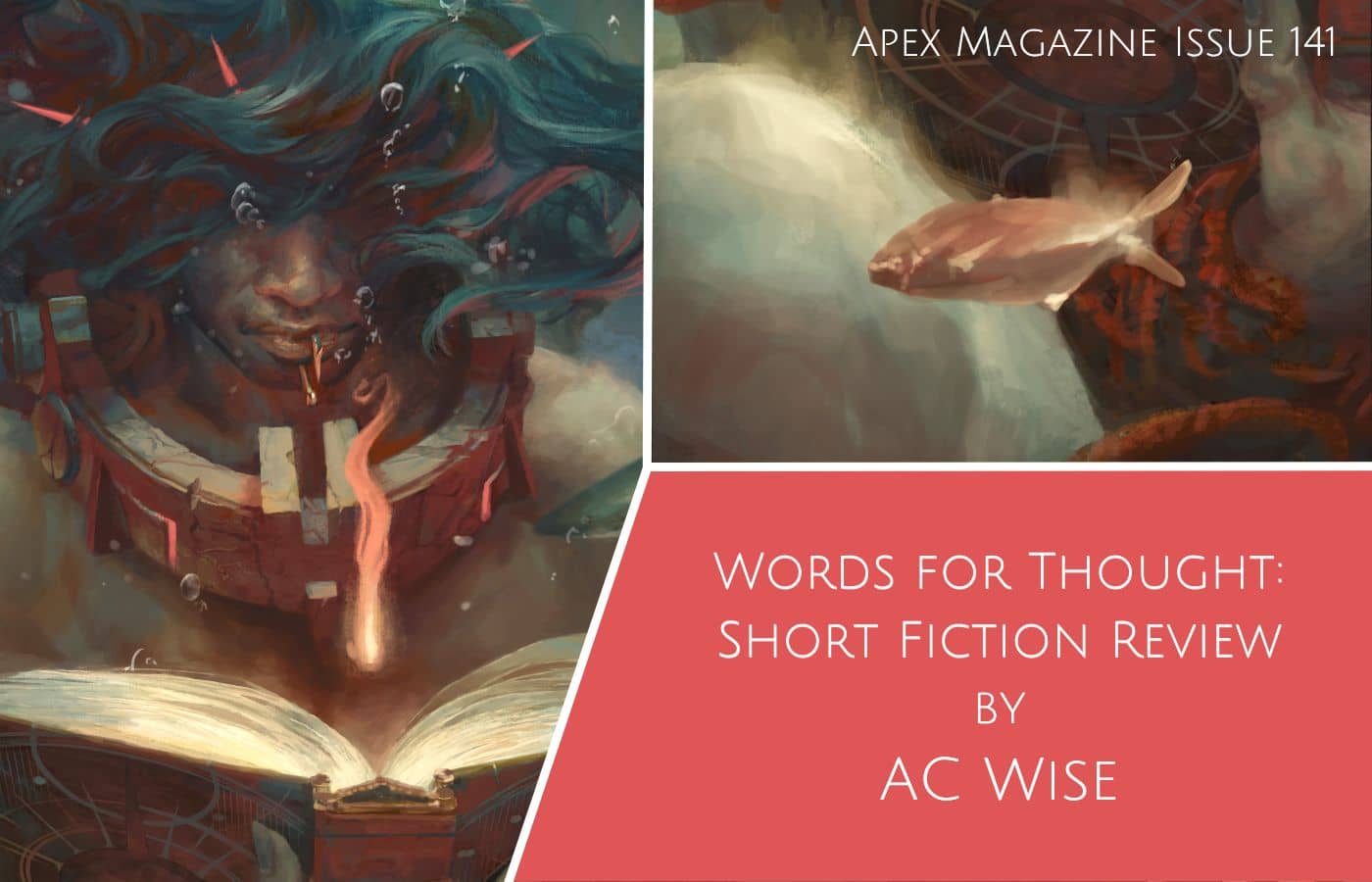
Welcome back to “Words for Thought”! After a brief hiatus the column has returned, and just in time for the tail end of spooky season. These five stories all deal with the monstrous in one way or another, but like the best monster stories, they’re also about far more than that–exploring love, grief, insecurity, hope, and the human condition.
“If Someone You Love Has Become a Vurdalak” by Sam J. Miller, published in The Dark, is a beautiful and heartbreaking story about addiction and the way love can make us vulnerable and open us up to pain.
Faraday’s twin brother Planck has become a vurdalak, an undead creature who can only be sustained by feeding on those closest to him.
Strangers and mere acquaintances are toxic to them. Vurdalaks can only derive nourishment in the presence of actual love. Vampires can make ethical choices about who they feed on, and how. Vurdalaks have no such freedom.
Before he was ever a vurdalak, Planck was an addict, feeding off his family’s good will and desire to help him, hurting them as they watched his self-destructive behavior, unable to help him break out of the vicious cycle. Many legends concerning undead creatures have them feeding specifically on family members and those closest to them, which gives them a particularly painful twist–not only do the living see their loved ones become monstrous creatures driven solely by hunger, but they themselves are the food, speaking to the idea that the people we’re most capable of hurting are those closest to us, because they care the most.
Miller does a beautiful job of exploring complicated family relationships, as well as each brother’s approach to love. Planck is quick to fall in love; Faraday avoids it, closing himself off from the vulnerability that comes with it. But we can’t choose who we love, especially when it comes to family, or stop loving them just because their behavior is painful. Love in and of itself can be an addiction, and the monstrousness of that concept is shown to great effect in this story. It’s dark and wonderfully-written, and like so many of Miller’s stories, uses the lens of the monstrous to explore that which is deeply human.
“I Want to Wear You Like a Glove” by Anneke Schwob, published in Baffling Magazine, pairs nicely with Miller’s story. It’s brief but effective, interspersing a series of missed connections posts with the reaction of the person reading them, who believes they may be written for and about her.
You will find us on Missed Connections. A hollow space, filled with loneliness, pulsing with need.
Like the vurdalak of Miller’s story, the creature(s) in Schwob’s story writing the missed connections posts thrive on love, or at very least the need for love–preying on the lonely and insecure who crave a sense of connection. The protagonist is also being preyed on by her human roommate, Adra, who digs into her insecurity and need for approval, and uses her for sex. The story is darkly sensual, and like Miller’s story, explores the way love and desire make us vulnerable to pain, and how even unhealthy relationships can be a form of addiction that isn’t easy to walk away from. Both stories effectively use the monstrous to delve into the flawed nature of humanity.
“Til the Greenteeth Draw Us Down” by Josh Rountree, published in The Deadlands, also features the dead using love to prey on the living, or at very least creatures who adopt the faces of dead loved ones in order to lure the living to their deaths. Set in a flooded Galveston (a setting Rountree also effectively uses in his novella The Ballad of Charlie Fish), the story centers on Rowdy and his sister Squirrel, orphaned when their parents were lost to the waters and taken in by their neighbor, Lady Lucy, an eccentric bookstore owner.
Black clouds squatted low against the city on the day Squirrel went missing. Cold rain splattered the windows, and we lounged around Lady Lucy’s cave of moldy books, imagining summer days when we might swim through the saltwater streets and dive from the third-story windows of beach hotels.
The waters of the flooded town are filled with greenteeth, creatures who use Squirrel’s love for her parents to lure her out into a storm, sending Rowdy, Lady Lucy, Bathroy the cat, and their neighbor Mr. Cortez out into the dangerous waters on a rescue mission. It’s a story about grief and loss, but also about coming out on the other side of a tragedy with hope, and found-family banding together to find a way to move forward together and start to heal. The world is beautifully described, and the characters are vivid and well-rounded, giving a sense of their lives beyond the page.
“Polar Shift” by Mir Seidel, published in Bourbon Penn, deals with a different kind of vulnerability and search for connection, and it’s the perfect uneasy story for spooky season.
The snow had drifted overnight, then hardened. No wind. They crunched forward in the half-dark without talking, pulling the sledge with the equipment. Under the black starry sky, Lev felt the particles stirring inside him, goading him. He glanced down at himself, feeling he might be glowing under his outdoor gear.
Two men keep a lonely vigil in an ice-bound research station surrounded by a hostile environment. Beyond the freezing temperatures and storms, there’s a strange glow from the sky, the effects of which are unknown. Their purpose at the station isn’t entirely clear—they may be there to study the glow, or they may be the subject of a study themselves, with unknown observers recording the effects of the glow and their isolation. The air of uncertainty and the questions left unanswered are precisely what make this story so effective.
Lev tries to connect to his partner, fit their situation into known parameters, and his failure only makes him more uneasy. Seidel pervades the story with a sense of wrongness, drawing the readers into the same situation as Lev, who is disoriented, struggling to piece together the details of his life and unable to trust his own memories. The story is highly atmospheric and just the right length to maintain the sense of tension and creeping dread created by leaving the truth of the situation up to the reader’s imagination.
“It Comes Through Us” by Koji A. Dae, published in Three-Lobed Burning Eye, is a roughly flash-length piece that feels like it’s in direct conversation with Schwob’s story from Baffling Magazine. The two could be set in the same world, or presenting two different perspectives on the same events, which makes them a fun paired read.
We have a space carved out of the world just for us. It’s an apartment in the city, a cabin in the woods, a basement in the suburbs. It’s big or small, tidy or dilapidated, but it is ours; and the important part is it rubs rough on the edges of your world. People cross their arms to stave off the chill when they pass, but they don’t know why. We know. They can feel our lair. We hide in plain sight.
Much like the collective voice of Schwob’s story, using missed connections posts to prey on the insecure, Dae gives us another collective voice, monsters operating beneath most people’s notice because they are outsiders; weirdos and loners most people overlook. They could be read as supernatural creatures, as in Schwob’s story, or they could be read as purely human, showing the mundane nature of evil, and the way society creates monsters through neglect, abuse, or simply looking the other way.
Like Schwob’s creatures, Dae’s monsters, whether human or inhuman, prey on insecurity and loneliness in order to feed and fill the void inside themselves. Their actions leave room for something even worse, a true cosmic horror, to use them as a gateway into this world, allowing the cycle of violence to start all over again. Like Schwob’s story, Dae’s piece is dark and visceral, exploring the grim idea that the need for connection can sometimes leave us open to harm and lead us to creating our own worst enemies.












